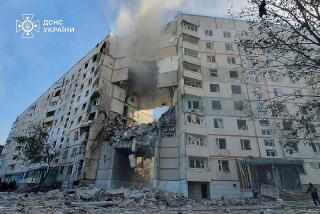Russian Troops Retake Grozny After 4-Day Battle
- Share via
MOSCOW — Under skies darkened by smoke from a burning oil refinery, Russian troops finally managed to retake control of Chechnya’s capital Saturday, but in many cases, their enemies simply melted away to fight another day.
For the fourth straight day, heavy fighting in Grozny between Russian forces and armed separatists raged. But by 3 p.m., Doku Zavgayev, leader of the republic’s pro-Moscow government, reported that there was only one major battle continuing, in a northern residential district.
“On the whole, the situation in the city is calm, and there are no reasons for panic,” Zavgayev told reporters.
But the rebels’ four-day offensive, the costliest for Russian forces since they stormed the now-devastated city on the northern slope of the Caucasus Mountains in December 1994, was an unsettling demonstration of independence leader Dzhokar M. Dudayev’s military prowess.
The 15-month-old Chechen war, in which 20,000 to 30,000 people have been killed, has also badly undermined Russian President Boris N. Yeltsin’s popularity. Yeltsin and his Security Council on Thursday approved in broad outlines a plan intended to restore peace to the region. But in his comments to reporters, Zavgayev said the latest attack left no room for negotiations with Dudayev.
“After Grozny has once again been covered with corpses, we must conduct talks with terrorists in their language,” he said.
As night fell, Grozny’s streets were deserted. The silence was broken from time to time by shots fired from Russian armored personnel carriers, and soaring flames from the Lenin oil refinery or one of its pipelines lighted up the sky.
*
The overwhelming majority of Grozny’s residents had to make do without electricity, heat, running water and telephone service, all victims of the recent fighting.
In one act of “sabotage” reported by the Itar-Tass news agency, four people died on the operating table at the city’s Hospital No. 9 early Saturday after the power was cut.
The rebels’ onslaught, which began Wednesday, was the first bid by Dudayev to retake Grozny since the Russians first invaded, driving him out and reducing much of the city of 400,000 to ruins. By Saturday evening, Russian troops had gotten the upper hand in the city’s center and most neighborhoods, though one Russian officer told the Interfax news agency that armed separatists still were holding strong positions on the southern outskirts.
Sources in the pro-Moscow Chechen government told Interfax that other guerrillas were gradually filtering out of the city. Musa Dzhamakhanov, head of the Chechen government’s external relations department, called the rebels nothing more than “scum and marauders,” and Zavgayev accused them of carting off stolen TV sets, carpets, refrigerators and clothes by the carload.
It was unclear how many rebels had been killed and wounded in the four-day campaign. Russian sources on Saturday estimated that at least 800 of Dudayev’s fighters took part in the attack and that 150 had been killed.
Official casualty reports from the Russian side said there were 51 killed and 36 missing since Wednesday, but unofficial estimates cited by Russia’s NTV from Grozny said more than 70 Russian soldiers had died and more than 200 were wounded.
In the northern neighborhood of Zavodskoi, a huge fire spewed smoke that cast a dirty, thick twilight over the city. Reports from the scene differed as to whether the Lenin refinery or one of its pipelines was ablaze.
The fire continued into the evening, and Russian military commanders ordered tanks to move on the site after rebel gunmen kept repair crews away for nearly 12 hours.
Chechen Deputy Prime Minister Abdul Bugayev said boys as young as 11 were hiding in Grozny’s ruined buildings and firing on Russian troops and Chechen police with grenade launchers and machine guns left by the rebels.
Sniper fire was reported in many parts of the city. NTV said the separatists invaded a workers’ dormitory and took 84 Russian construction workers hostage, boosting the total number of the rebels’ captives to about 200.
More to Read
Sign up for Essential California
The most important California stories and recommendations in your inbox every morning.
You may occasionally receive promotional content from the Los Angeles Times.













